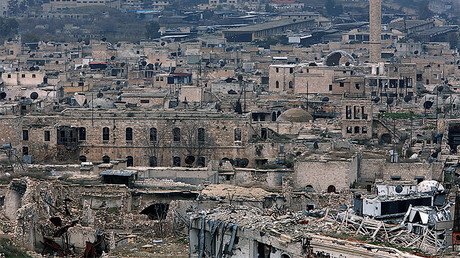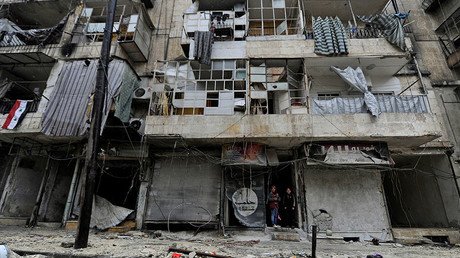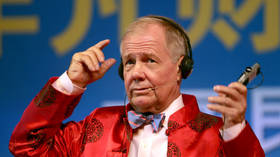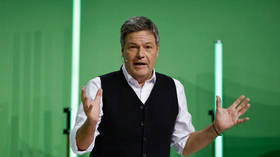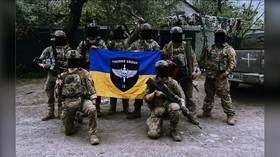Politicization of Syria's conflict hampers humanitarian effort – Red Cross to RT
The numerous actors involved in the highly-politicized and publicized Syrian conflict makes the humanitarian work much more difficult, but the Syrian government remains one of the most reliable partners for aid organizations, the head of the Red Cross in Syria told RT.
The Syrian conflict has become a major challenge for the Red Cross, which seeks to provide impartial humanitarian relief to civilians caught in the crossfire of the country's six-year war, the Head of the International Committee of the Red Cross (ICRC) delegation to Syria Marianne Gasser told RT in an exclusive interview.
Accusations go alongside with humanitarian work
A recent UN report accusing all sides of the conflict of war crimes, has pinned some blame on the ICRC for overseeing the December 2016 evacuation of Aleppo, described as a “war crime of forced displacement.”
“It’s not the first time when the ICRC of the SARC is being accused. Whatever we do we could be accused by one side or the other,” Gasser said. “But we maintain our principle approach, our main mission is humanitarian, to save lives, to bring some relief to the people in need. And I would not focus too much whether we’re accused or not from one side or the other.”
Despite the seriousness of such accusations, its unlikely to affect ICRC's activities in Syria.
“We did play an active role during evacuation of civilians and even of fighters from Eastern Aleppo city into Western rural Aleppo. Playing an active role was to implement an agreement which was reached by the political parties,” Gasser told RT. “Through this evacuation we did some lifesaving operations, we could evacuate more than 100 wounded and sick from Eastern Aleppo. We even evacuated some orphans… We hope that once the situation will calm down that the people will be able to return back to their homes.”
Aleppo liberation media coverage over-politicized
The suffering of Aleppo's civilians were under the media's spotlight during the Syrian Army’s operation to liberate the city, but the coverage abruptly ended after the terrorist forces had been crushed in the city. ICRC reports, which contributed to the media hysteria, have also mostly stopped flowing after the liberation.
“Maybe the evacuation of Aleppo was very much taken…We did issue news releases, we were active on social media it was taken a lot by the international media,” Gasser told RT.
Gasser said the media coverage was very politicized and only harmed the humanitarian efforts undertaken by the ICRC and other parties.
“Aleppo was the focus if I’m not mistaken since July 2016, when there was intense fighting in northern part of the [western] Aleppo city, the Castello road. And maybe I have to admit a big part was also politicized. This is another challenge that we face sometimes in our daily work,” Gasser said.
“Humanitarian action can be politicized and that is not helpful for humanitarian workers who want to reach people in need. So yes, I do agree it was a little too much focus in the media on Aleppo.”
The organization, according to Gasser, stopped actively reporting on the humanitarian situation not because of political reasons, but simply as the “big operation” to evacuate “civilians and even fighters” ended with the battle itself.
A lack of reports does not mean that the ICRC has stopped providing humanitarian aid to Aleppo's civilians and hundreds of thousands of refugees taking shelter in the city recovering from the battle.
“We’re continuing our operations in Aleppo, like even before the evacuation operation, because we were present. Aleppo is hosting an estimated number of 400,000 displaced people even from the past, from rural Aleppo, from Idlib, from Homs,” Gasser said.
ICRC cooperates with all humanitarian actors, but White Helmets
ICRC operates in Syria with permision and in close cooperation with Syria’s Government, being one of the main humanitarian actors in the country, alongside the Syrian Arab Red Crescent (SARC) and its “branches and sub-branches.” The ICRC also tries to maintain cooperation with all other humanitarian relief organizations.
“On the ground we do coordinate with other humanitarian actors, but also with Russian Federation and definitely with the Syrian Government, because we cannot work without the consent of the Syrian Government and we also count on their facilitation,” Gasser told RT.
Despite providing help to civilians on all sides of the Syrian conflict, the ICRC, somehow, did not cross paths with the notorious Oscar-winning and much-praised White Helmets. Gasser “heard” about their alleged humanitarian endeavors, but did not actually meet them in the field.
“Our main partner is the Syrian Arab Red Crescent. We had no direct contact with the White Helmets even when we cross the frontlines to go to opposition-controlled areas. They did not ask for our support, we did not ask for their support. We heard that they did evacuate wounded and sick,” Gasser said.
Western MSM complicit in fueling ‘artificially’ ignited Syrian war – Bolivian filmmaker to RT https://t.co/hqNfSgUnda
— RT (@RT_com) February 1, 2017
Scale and length of the Syrian conflict are major challenges for ICRC
The Syrian war, which has been going on for almost six years already, is one of the most complicated conflicts for humanitarian organizations, Gasser believes. Virtually no family in Syria was left unaffected by the ongoing bloodshed.
“The major challenges are today to reach all people in need because in many areas in the country fighting is still ongoing,” Gasser said.
The other major issue is the large number of warring parties with which humanitarian organizations have to establish relationships to ensure the safety of both workers and civilians. The only group ICRC has absolutely no contact with is the Islamic State (IS, formerly ISIS/ISIL) terrorist organization.
“You have numerous armed groups and fragmented where we need also to be in contact with them for our own acceptance and for the protection security of the civilian population. Because if we need to deliver aid or to evacuate the wounded and sick we need also protection and safety, respect of the Red Cross, Red Crescent emblem,” Gasser told RT.
